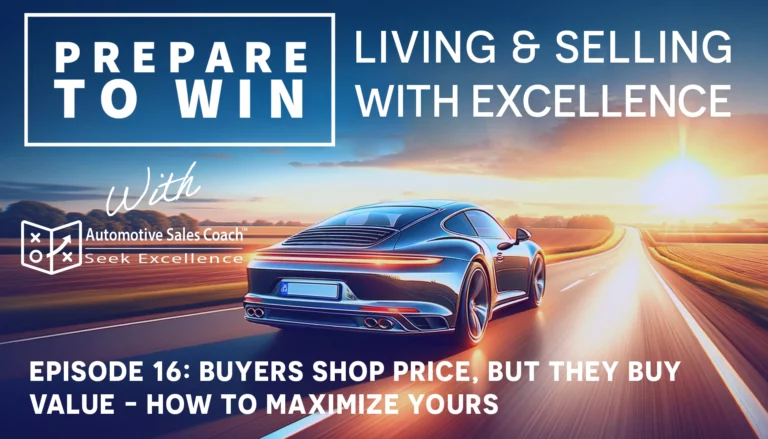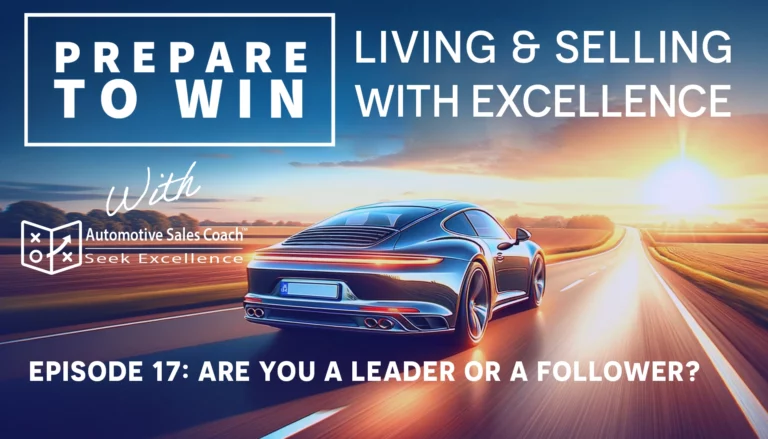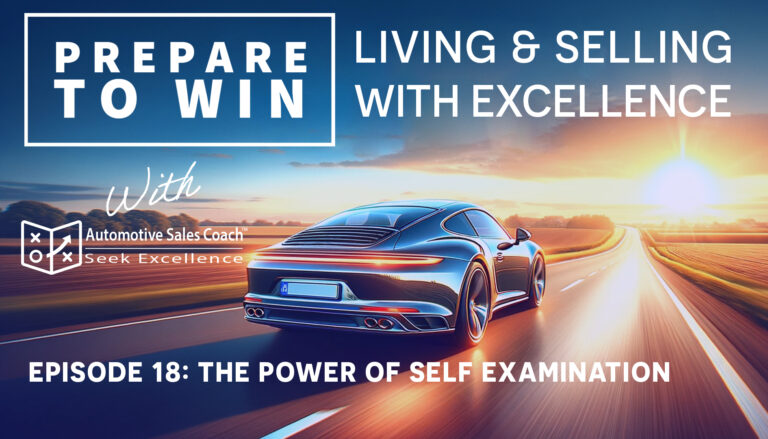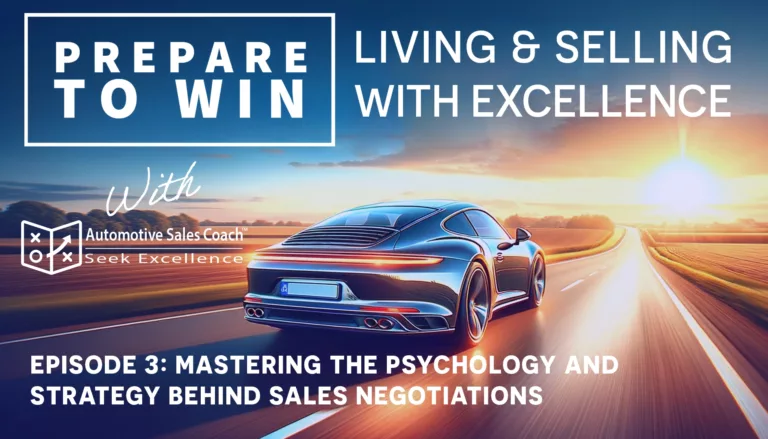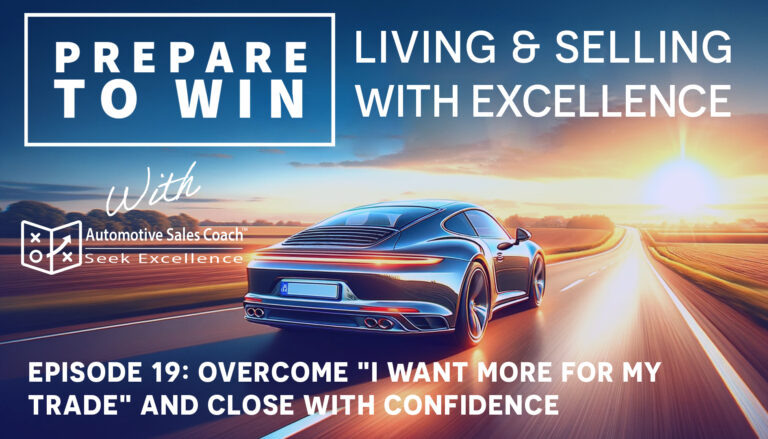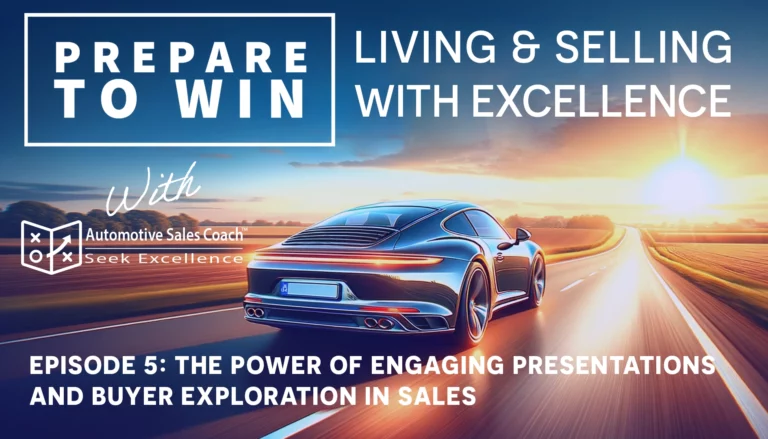A Committed Buyer is Flexible!
Welcome to another episode of ‘Prepare to Win,’ the podcast redefining automotive sales. Today, we delve into the intricate psychology of buyer commitment. This episode isn’t just a discussion; it’s a journey into understanding the human element of sales.
Discover why active listening is crucial, learn how to transform buyer fears into confident commitments, and explore the art of personalizing your sales strategy. Whether you’re a seasoned sales professional or just starting, this episode offers valuable insights into making each sale not just a transaction but a connection.
This episode is filled with real-life examples, practical strategies, and a deep dive into the psyche of both the seller and the buyer. We hope you find that ‘Prepare to Win’ is more than a podcast; it’s a tool to help you live and sell with excellence. Please like, subscribe, and follow for more insightful episodes. Your journey to excellence in automotive sales starts here!
David Lowe: 0:00
Welcome to Prepare to Win. I’m David Lowe, the Automotive Sales Coach, with Grace Lupoi, one of our training coaches, and we’re excited to have you Today. We’re talking about drive time tips on living and selling with excellence. It’s gonna be a deep one today – the psychology of buyer commitment. You need to understand how important buyer commitment is to selling with excellence, to getting the buyer to feel comfortable saying yes, can I drive it home today? All right, let’s go.
Grace Lupoi: 0:37
Okay, David, so we’re talking about psychology, right, and how this really goes into understanding our buyer behind this commitment process, and we also know that we call our whole sales process. Really it’s a psychology class or a course. We talk about how people think and how they are, and, especially during this step of really getting equipment, let’s talk about what that looks like.
David Lowe: 0:56
So you’re so right. Right Selling is psychology and it’s not manipulation, it’s understanding human nature. Listen, you have to know your audience and you have to know your buyers. How do we help them if we don’t understand them? So in some of the last episodes we talked about active listening to understand our buyer and helping, using that to help demonstrate our products. And so we have to understand our buyer personally and we can also understand them globally, meaning not the individual, but how most of us think and act. For instance, we know that almost every buyer, everywhere throughout the history of time, is always feared making a purchase mistake. Right, I don’t wanna buy the wrong thing, I sure don’t wanna pay too much and I don’t wanna be hastily pressured at doing it one or two. That’s basic psychology. It’s built into us and I think it’s even perpetuated through culture. We also know the psychology of buying means. I have to figure out what am I gonna buy. I have to figure out where am I gonna buy it, when do I wanna buy it from and what do I think of fair price. These are answers that subconsciously I have to answer. So when we talk about psychology, it’s really the way people think and act. All right. So let’s get back to this commitment, the psychology of commitment. By the way, commitment is the big C word right now. Nobody wants to make a commitment on anything, do we right? We wanna use text to say yes or no, whatever. So making a commitment is a big deal. Because of a commitment, right. When somebody makes a commitment, they become really flexible, and that’s the power of this thing. A committed buyer is flexible. When I decide I’m gonna do things, I’m gonna put up with a lot to get there. If I decide I’m going to Las Vegas, I wanna this vacation, I’m committed this vacation, even if my flight is canceled, I’m gonna seek another flight. I’m not turning around and going home. It’s commitment that helps me overcome the obstacles and hit my destination. Commitment is so important to the sale. So we’re talking about having our buyer make a commitment, and not a commitment to us, but a commitment to themselves. This is the right car and I’m buying this car today, right? Okay, now there’s a big thing about commitment in terms of how we ask for this commitment. This is really important, and understanding how we ask will help the buyer see is this the right product for me and do I wanna take it or not. So let me tell you how powerful this is. Now I wanna get into some of our technology on gaining commitment. Because, listen, the old car thing pulled here in the sold road that’s what they call the trial close. When I started it’s such garbage. Pull here, I did it, you know, when I sold cars. It must be working. I did it for a long time. I was successful. But when you analyze it, does that really build commitment Just by saying word sold road, right, that it helps, it doesn’t hurt, don’t get me wrong. But couldn’t we do a much more powerful trial close than that? Answer, of course, is yes. When we understand human nature, we can do that. So we’re gonna talk about that formula. I wanna talk about commitment in my own life. Everything that I bought that I made a commitment to, I paid more for it than I thought I was gonna pay. Is that sound familiar?
Grace Lupoi: 4:34
Yes, it does.
David Lowe: 4:35
Anybody else in that? Cause, I think when I decide I wanna buy something, I kinda have an idea what I wanna pay, usually when I find what I want is more money In fact, usually is a bad word, because it’s always more money I mean, we never wanna pay what it takes to buy what we wanna buy. And listen, if you’re a student of human nature, of psychology and of selling, listen to that statement. No one wants to pay what it takes to buy what they wanna buy. We just don’t. So why do we commitment? Once we see the value and desire something that my life is gonna be better with it and suck without it, we make a commitment right. And once we make a commitment, we’re willing to do what it takes to get it. Does that make sense? We become in a sense flexible, right. So I was buying a coat, in fact the coat I wear now. I love the coat, so I’ve had it 10 years finally. So the story is getting dated, I guess, but it was so powerful because it actually mirrors a Seinfeld episode that I saw right. But let me just tell you my story, then you might have seen a Seinfeld episode. The same thing happens to Jerry, but I go to get a new leather coat, and I’ve got motorcycle jacks, but I wanted a dress coat. So I went to the mall by us and there’s a Saks Fifth Avenue there, and so I went to Saks. They have boss stuff. I like bosses. So I went there and I saw it. Nothing. I’m a minion. You guys can’t tell on camera, but I’m tiny, five, seven maybe, and on a good day, and so when I have broader shoulders and so when I find a jacket that fits my chest and shoulders, it’s always too long and I look funny, right. So my hopes of getting something aren’t always great, because you can’t really have a leather, nice jacket tailored up, okay, anyway. So I go there and I look on the Raxx’s Boss Jacket. It’s just beautiful jacket, it was lamb, it was beautiful. I pick it up, it’s gorgeous. Of course it won’t fit me. They never do so I picked the size I thought I’d put it on. Of course it fit my shoulders, I love the fit, but of course it’s too long. I looked in the mirror and it was about perfect. I’m like wow, I cannot believe that I found the coat Now. My wife was with me and she was across the shop and I’m like Mary, come on over here, look at this. I found the jacket, I love this jacket, I’m getting this jacket. And then she asked guess what question she asked me.
Grace Lupoi: 7:03
How much?
David Lowe: 7:05
How much is it?
Grace Lupoi: 7:06
I said I don’t know, I don’t know, I don’t care.
David Lowe: 7:09
Well, I hadn’t looked at it yet. So she takes the tag from behind my neck and she goes you’re gonna wanna look. So I take the coat off and I look and I’m like I ain’t buying this jacket Holy cow. There’s no way I’m gonna buy this jacket. It’s so expensive. So I put it back on the rack and we went down to the mall I think it was Wilson’s or some other leather place. Now they have very nice jackets and every jacket I picked up I was like this looks like roadkill, mary. You know what I mean. See, now there was a new benchmark in my mind. We’ll have future episodes about the power of benchmarking, won’t we? And because this is a powerful force, nothing’s good or bad till compared to something else. And so every jacket I looked at was compared to what that jacket at Saks. So we’re looking at them. And then I finally say to Mary you know, mary, I had my last jacket 10 years, in other words, when you spread the cost over those years, it’s not too much, is it Nope? Now I’m giving you, salesman, a tip. That’s called value. What am I getting from my money? It’s not price, is value. Now, most salesmen don’t do that for you, so I had to come on it on my own. Of course. We went back and got the jacket. I paid way more than I thought I’d pay for a jacket and I love the jacket. I have never regretted buying it.
Grace Lupoi: 8:27
That’s what you wanted right.
David Lowe: 8:27
Isn’t that the truth? I think when we settle, if we can afford it, we should get what we want. Because when we settle, every time we look at that, if I got the other jacket, every time I put it on I wish I had the other one. And so when we settle, we lose. Now I’m not saying there might have been a stage in my life I couldn’t afford that jacket and I would have got committed to a jacket in my range. So it really boils down to affordability. I could afford it, but I couldn’t justify it at first.Grace Lupoi: 8:56
Until you did.David Lowe: 8:56
Couldn’t make it. But once I committed, this is my jacket, I’m buying this jacket, I was willing to do it, and there’s a Seinfeld episode where he buys this way jacket and Kramer comes. How much did you pay for it? Jerry won’t tell you this. It’s so much. It’s the same thing, and so this is a principle, I think across the board, that when we find what we want, it’s always more money, and for us to do or pay what it takes to get it, we have to be really committed. Doesn’t it make sense then, as a salesman, before you sit down and finalize numbers with a buyer, that you gain a buying commitment? So, yeah, one of the biggest problems that salesmen what does salesmen do? Here’s our numbers. Would you please buy our car? It’s so backwards. Right, we need to get a buying commitment before we. What do we know about the numbers? The price is always Way too high. Way too high and the trade’s always Way too low and the payments are more than they thought they’re gonna be, right, we know that. So, listen, I don’t wanna ask them to buy, I wanna first show them payments and price and trade. How is the higher price and higher payments and lower trade gonna get them to say, yes, that’s something they’re not committed to? Right, doesn’t make any sense, right? And so now people I talked to people all the time. But the first house, whatever, they always say, yeah, we’re pre-approved, we wanna buy a house for this much. And then they go well, you know, that was nice, so we could go up to that. And they all, we all do it. It’s nature Once we decide, okay. So now we get to the art of salesmanship. We talk about the psychology of commitment. If I know my buyer needs to be committed to pay what it takes to get the color they want, right, I owe it to them to help them commit. I owe it to them. If they don’t commit, they may not pay what it takes and they leave without the life they came for. I don’t just owe it to myself, right, I owe it to them. So we’re using psychology for good, we’re using human nature for good. So the psychology of the commitment is I’ve already bought it. How am I gonna pay for it? Right? Does that make sense? I don’t even wanna pay that much for it, but I’m gonna pay for it, okay. So in a car deal, we have a thing called the trial clause. Right, we suggest, no matter what you’re selling, that you agree on the product before you finalize the price, meaning it looks like we found the right blank. If we can put together, right, if everything makes sense, is that the one you wanna own? It makes sense that we get a commitment on product before we go for commitment on pricing, right, right? And the cool thing about today’s internet most people have been online 16, 20, 30, whatever. Before I bought my new exercise bag from Nordetrack, I went online and looked it up. People have been online. They have information. Price is not a surprise. So price is not a yes, or they may be reason they don’t buy, but it’s not certainly reason that they don’t. If they want to buy or not, it’s really based on the product, not the price. So price is not a surprise. So let’s focus on getting a commitment on the product before we get a commitment on it. All right. So the psychology Buyers have the fears I don’t wanna make a buying mistake. And the closer they get to buying, the more the fear ramps up. Right, so the problem with most salespeople is they’re under trained or untrained. How do you ask somebody to buy without pressure? How do you make it comfortable?
Grace Lupoi: 12:24
Before you would do that, we’ve gotta let them close themselves.
David Lowe: 12:27
That’s it okay, talk about that. How do we help people close themselves? Right, we gotta help them think through the product. Right? Exactly, is this the right product for me? So we really facilitate that. Does that make sense? We don’t tell this is the right product for you, you should buy it today, right? We don’t tell them that. We ask them On their clothes themselves. Right, that’s right.
Grace Lupoi: 12:50
And we know that when selling a car, there’s a few key aspects. Right these hot buttons, if you will, we wanna touch on, and really that all starts with a conversation. These questions are designed to create conversation which, once again, if I skipped a step previously, I might not be able to tell that to them.David Lowe: 13:07
That’s right.
Grace Lupoi: 13:08
So for one example, right I might say David, I know you drive a lot for work, right I know, and hopefully that engine’s gonna really get up and go for you. Tell me a little bit about how you thought about the performance right. Get them to have that conversation, because don’t we all close ourselves? Yes, right.
David Lowe: 13:22
So if I say I really love the power, that’s the psychology of commitment. I just said to myself check, this is the right car. That’s the psychology of commitment. Commitment drives out there. Commitment drives out fear. I have made a decision. I no longer fear buying the wrong product. Now let’s talk about price Right Right. We’ve already started talking some things about negotiating, closing. We’re gonna talk a lot about that over these episodes because it’s a big thing and we have a lot of different angles to bring so in our dealership playbook, automotive sales coaches, online selling training portal has pretty much everything in it and of course, a lot of it has to do with helping buyers commit and feel comfortable and negotiate, and we have a lot of that stuff. So we really teach that. You know what? Let’s slow down and earn the right to ask people to buy. That’s all. Isn’t that character integrity a big deal? We go all the way back to episode one. I just how do I have a healthy pride if I don’t sell with character integrity or don’t live? And if I don’t have a healthy pride, how do I have joy, peace and satisfaction? I don’t know how it works. We all go together. So a lot of trainers are out there training their treks and you know what, during COVID, a lot of these trainers rose up. Everybody was buying cars and everybody thought they were better than they were selling them. Everybody made more money. Like, one day we couldn’t hold gross and the next day we could, and somehow we got better, without training or without changing what we do right. So everybody gave ourselves. Then we do that. Be honest with yourself. Give ourselves more credit than we deserve. During this, when the market, supplies went, demand went up, profits, of course went up. Dealerships, salespeople, managers all made money not cause we were better, cause there was less price, let’s just admit it. And that didn’t last long couple of years. And now it’s going back, and so if we wanna be a master sales professional, we have to do more than ride the market wave. We’ve got to right, focus on what we do and how well we do it, our knowledge and our skills and our actions. Right, that’s everything Okay. So we’re going to this commitment sense asking for your trial closed. We wanna do it in a way that builds, that feeds off our integrity and character. I really wanna, before I say grace, sounds like we have the right car. If we work out the details that you want to drive at home today, before I ask you to buy it, I wanna make sure it’s the right car.
Grace Lupoi: 16:01
I don’t urge you.
David Lowe: 16:02
I got her in the right. Yeah, be honest with it. I don’t want you to buy one car from me, I want you to buy every car from me. I don’t want you to wake up. So some people just close. It doesn’t matter, and I you know, maybe you just want the quick sale and you don’t care about anything else. This podcast probably isn’t for those people, because it’s not really, although they can use our techniques and so cars and make more money. You will definitely make more money doing this stuff, but that’s not what we’re about. We’re definitely about doing it so well that you’re a benefit to other people and you’re a benefit to your healthy pride, right? So we really wanna slow down before we move into finalizing numbers and make sure we have the right car and once again we go back to asking good questions, actively listening, affirming and moving on. What if I could get the buyer to do his own checklist in his own mind? So subconsciously we teach in a dealership playbook. We teach the things that we know subconsciously through millions of dollars of research from one of the big manufacturers what happens during a test drive, subconsciously, what decisions are being made. So all we did was take those subconscious decisions being made and pull them to the conscious mind, didn’t we? So what if I asked him hey, it’s like you said, what do you think about the performance? I got that pulled out of the back of the mind to where the front right, and they made a check more consciously. I really like the way this drives. That’s the psychology of the clothes, right, and so, and if I that’s doing it really well, what do you think of performance? Right, that’s well. If we wanna do it like a master, we’ll do it like you did it. We’ll customize it. So, grace, let’s talk about the car real quick. One of the biggest things was you put on a lot of miles as a sales rep. You’re on the road a lot, the highway a lot. You’ve got the radar detector in your car, so you drive fast. Now, we didn’t want the better gas mileage that this turbo gets us. Right, that’s great. That’s gonna save us money. It’s really about performance for you, though. Right, what did you think about the performance of the? Okay, so I just gave you a little insight to what it looks like to personalize the commitment. I’ve told a story that takes the buyer into their life to consider how am I gonna feel, driving this on the road, on the way to work. So when they say I really like it, that commitment, who cares? If they made a commitment to you, they can break a commitment they make to you. They make a commitment to themselves. That’s everything it’s over, all right. So the psychology of commitment is this Once the buyer decides I’m buying this product, the buyer will find a way to justify pain more I did for my leather jacket. I bet you every one of you have done it before, so you know it’s true. So why not develop the skill set to help your buyer go through that Cause? I’m gonna just tell you right now they’re not gonna buy what they want for what they wanna pay period. That’s just the way it is right. Nothing costs what I want it to cost. Everything’s more. So our job is not to lower the price. I’d like to buy a steak at Ruth Kristen. I’d like to pay 10 bucks. The job is not to get the steak down to 10 bucks. The job is get the value and commitment to eating there up to whatever it takes to eat there. So when we do this, people don’t wanna spend what they need to spend to get what they want. Your job is to facilitate that. Your whole job is make them feel comfortable, isn’t it? If I can make them feel comfortable, I wouldn’t. Then, when I put the numbers down, we can work together to figure out a way to make it work. But it starts with what Commitment. Commitment builds flexibility. Commitment closes car deals. Commitment creates excited, loyal, lifetime customers. And commitment will give you a healthy pride.
Grace Lupoi: 20:06
Absolutely All right, david. Well, that really sums up today’s episode. That’s right, talking about that commitment to the product and really making sure we use the psychology to get us there, right. Thank you guys for joining us today. Really appreciate you guys and again, our goal is to help serve you guys, live and sell better or with excellence, right. So hopefully we’ve been a benefit to you. Please like, follow, subscribe wherever you get yours, david.
David Lowe: 20:28
Yeah, we really appreciate you. We know how valuable time is. Thank you for making the commitment to join us right. We hope you continue to make that commitment. I’m gonna give you a last challenge what things in your life haven’t you committed to? Because if you commit to it, you’ll find a way to get it done. A lot of people out there say I wish I was in better shape, but they haven’t committed to any type of program, whether it be diet or exercise, to get there. A lot of people want things but they don’t get them because they need to start with what A commitment says I’m willing to do what it takes to get what I want to get. That’s the psychology of commitment, and that commitment gives you the strength and the power to overcome obstacles and achieve your results. So, getting a commitment we talked about it today with our buyers how to comfortably guide them, the importance of it. I wanna leave you with this it’s everything in your life, what you commit to, you can succeed at. So, whatever you want, make a commitment and live and work with excellence. Thanks for joining us.


